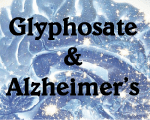A study was published in the journal Frontiers in Molecular Neuroscience looking at the effects of ketones as brain fuel and their use in treating Alzheimer’s disease. The title of the study is: Can Ketones Help Rescue Brain Fuel Supply in Later Life? Implications for Cognitive Health during Aging and the Treatment of Alzheimer’s Disease.
Glucose is the sole metabolic fuel used for nearly all brain functions under normal physiological conditions, but the brain will metabolize ketone bodies for energy when access to glucose is limited, as would occur during water-only therapeutic fasting in humans or during calorie restriction in mice. It has long been known that water-only fasting or calorie restriction is effective in managing epilepsy in humans and mice. (Source: Using the High Fat Ketogenic Diet to Heal Brain Tumors.)
Ketones can also be induced by diet as well, by restricting sugar and carbohydrates for a high fat and moderate protein diet. The ketogenic diet was developed at Johns Hopkins hospital in the 1920s as a natural cure for epilepsy, when drugs failed.
was developed at Johns Hopkins hospital in the 1920s as a natural cure for epilepsy, when drugs failed.
In recent years, the effects of a ketogenic diet has been studied in relation to dementia and Alzheimer’s disease in older people, as Alzheimer’s disease is increasingly being seen as a “Type 3” form of diabetes. However, since a diet cannot be patented, mainstream medicine has instead focused on pharmaceutical drugs and vaccines to combat diseases like Alzheimer’s, as such drugs are seen as a financial windfall for pharmaceutical companies, with so many Americans in the “Baby Boomer” age group entering into their senior years.
This study from Frontiers in Molecular Neuroscience shows great promise in utilizing a dietary approach in preventing and fighting Alzheimer’s disease. Previously documented are many stories of family members and caregivers seeing huge improvements in Alzheimer’s disease simply by adding coconut oil to the diet. Coconut oil naturally provides a form of ketone energy to the brain.
Can Ketones Help Rescue Brain Fuel Supply in Later Life? Implications for Cognitive Health during Aging and the Treatment of Alzheimer’s Disease
Frontiers in Molecular Neuroscience
Abstract
We propose that brain energy deficit is an important pre-symptomatic feature of Alzheimer’s disease (AD) that requires closer attention in the development of AD therapeutics. Our rationale is fourfold: (i) Glucose uptake is lower in the frontal cortex of people >65 years-old despite cognitive scores that are normal for age. (ii) The regional deficit in brain glucose uptake is present in adults
Read the Full Study HERE.
(Source: healthimpactnews.com; August 10, 2016; http://tinyurl.com/guk4vcq)




